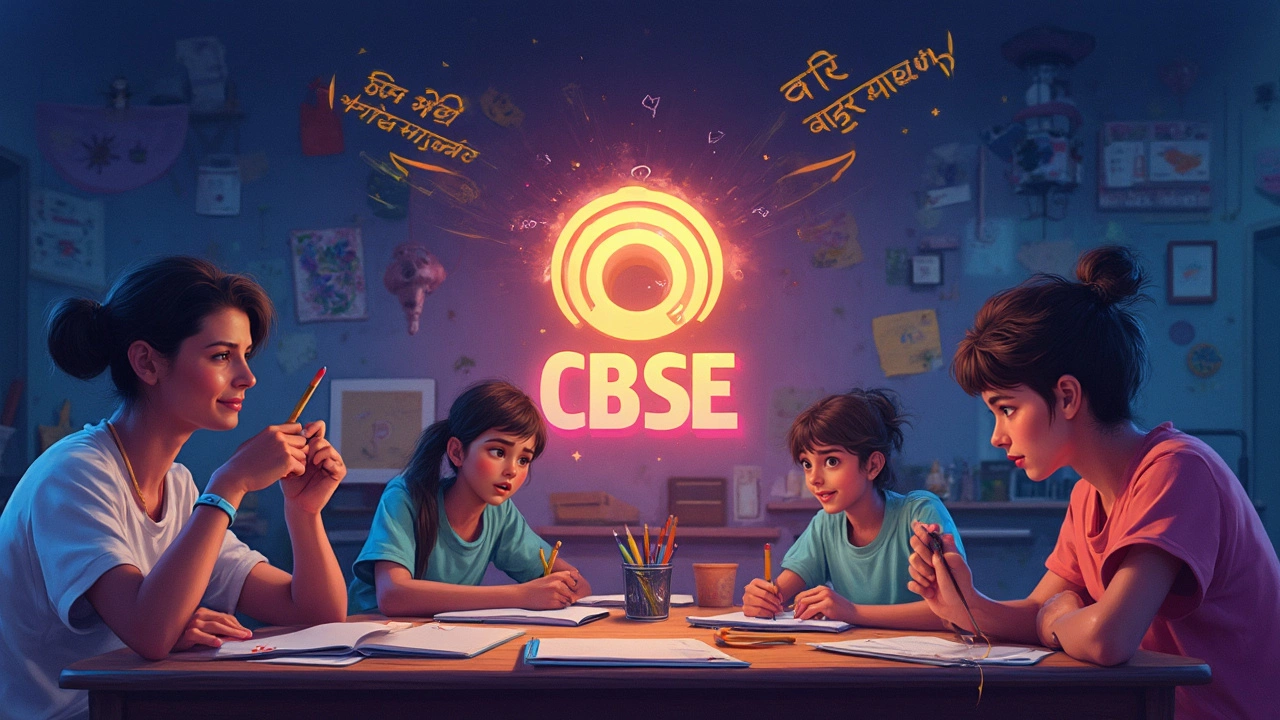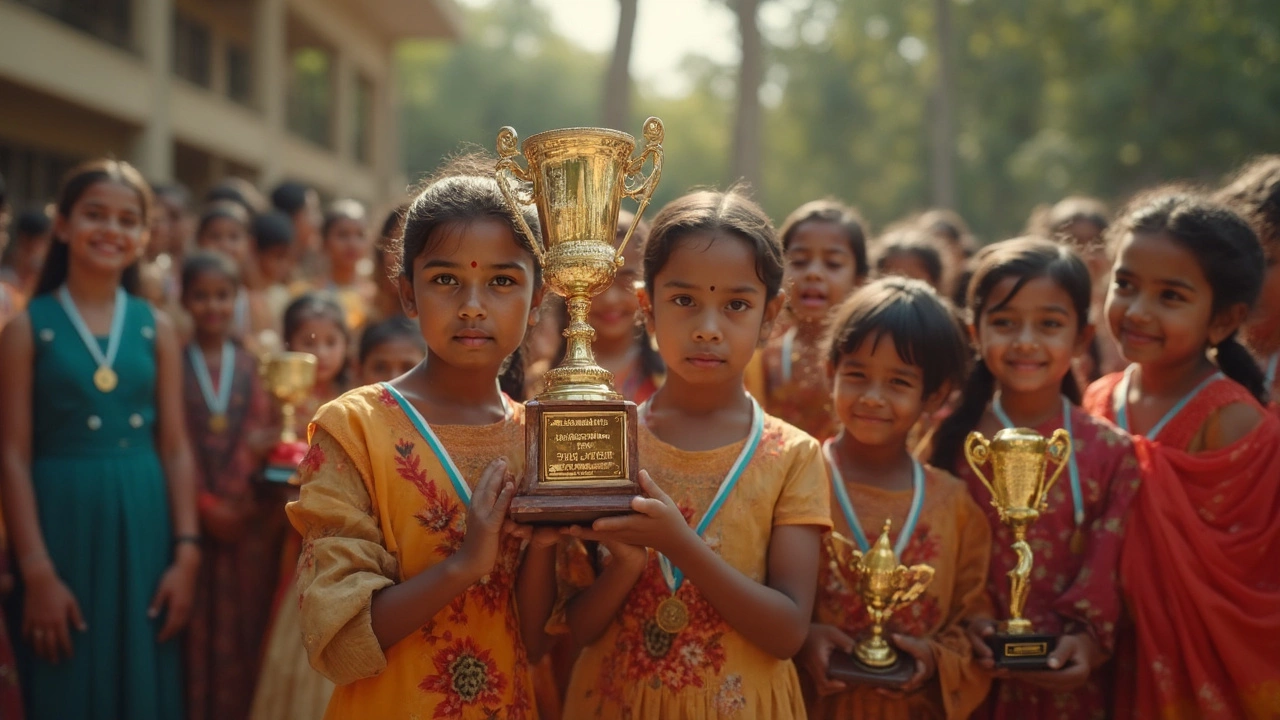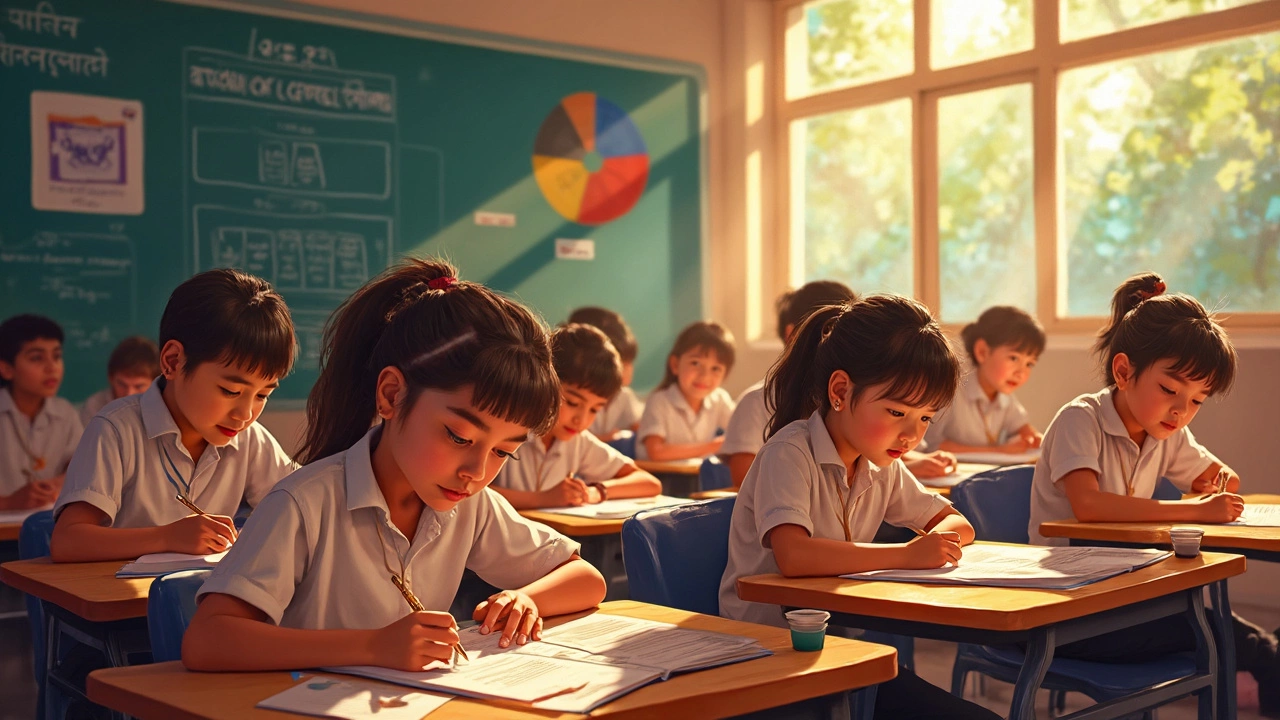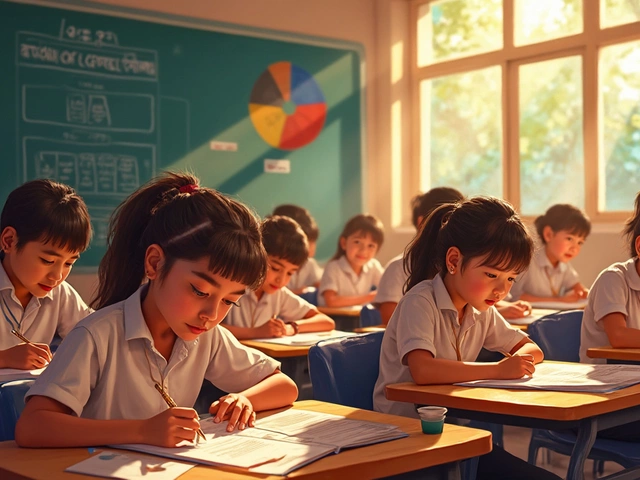Everybody wants to know who the ‘best’ CBSE topper is—parents, students, even neighbours who show up with laddus the day results drop. Truth is, it’s not as straightforward as you’d think. The CBSE doesn’t actually hand out an official trophy for ‘best topper’; it simply releases a list of students with the highest marks each year. You might spot one or a bunch of names tied at the top—sometimes with near-perfect scores that make the rest of us do a double take.
If you’re hoping for a single face to go with the title, like in those stories where a student scores 499 or 500 out of 500, you’ll often find shared ranks in CBSE’s system. It’s not just about beating your classmates, but acing a national exam taken by over a million students. That means the ‘best’ topper could be more than one person, each with their own story of hard work, lucky guesses, and all-nighters.
So if you or your kid is aiming for the stars, don’t get caught up in chasing just the biggest number. Keep reading, and I’ll break down exactly how toppers are picked, what makes a top score possible, and what you can actually learn from those kids who end up at the front of every coaching ad the next week.
- Is There a Real 'Best' CBSE Topper?
- How CBSE Marks and Ranks Students
- Topper Stories: More Than Just Numbers
- Tips from Top-Scoring Students
- Beyond Ranks: What Really Matters
Is There a Real 'Best' CBSE Topper?
This might surprise you, but the CBSE topper status is not an official throne handed out by the board. Though people love talking about 'the best' topper, CBSE itself just posts a list of students with the highest marks. Usually, this means looking at the Class 10 and 12 result sheets where you might see more than one name topping the list. Joint toppers have become common because hundreds of students score above 95%, with quite a few even getting full marks.
For example, in 2023, over 22,000 students scored above 95% in Class 12. The highest marks? Multiple students got a mind-boggling 499 out of 500—leaving no single ‘best’ but a group sharing the spotlight. There’s no nationwide competition afterward, no fancy trophy from CBSE HQ, just recognition in the result summary and usually a photo of the local topper in your city paper.
So, how do people decide who’s the ‘best’? Here’s what actually happens:
- CBSE results are based on raw scores. No bonus for effort, all-nighters, or extra sports badges.
- If several students score the highest total marks, they all become toppers for that year. There’s no sudden-death round.
- New in 2024: CBSE skipped publishing ‘topper names’ officially to reduce unhealthy competition, but regional media still hunt for local high scorers.
Let’s be honest, the title of best CBSE student is mostly used in conversation, not as an official tag. Real-life toppers come from all corners: Delhi, Jaipur, tiny towns, and even remote hills. So if you’re wondering who takes the crown, the answer is: it changes every year and is usually shared by a bunch of hardworking kids.
How CBSE Marks and Ranks Students
So, how does CBSE really decide who gets called a CBSE topper? It all starts with the standard system for setting question papers across India. Papers go through moderation, checking, and sometimes even a second round of re-checking—especially after 2020, when students were extra anxious about accuracy.
CBSE uses a marks-based system for both the 10th and 12th board exams. Students are graded out of 500 (in 12th, if they take five subjects). Your marks come from written exams, practicals, and internals, depending on the subject. After evaluation, the board puts out a result summary, which shows:
- Total marks for each subject
- Aggregate score out of 500
- Pass/fail status
- Grades (like A1, A2, etc.) alongside the actual marks
Here’s where it gets interesting. CBSE doesn’t give out ‘ranks’ as a public thing anymore. This changed back in 2016. Before that, All India Ranks (AIRs) were published, but then CBSE stopped because the ranking game often led to unnecessary pressure and comparison. Now, the board only shares top scores and toppers’ names with the media—no official “1st, 2nd, 3rd” across India.
If marks clash—say, two students get 499/500—they both get mentioned as toppers. There’s no behind-the-scenes tie-breaker. For CBSE results, you either top with your marks or you don’t. Subject-wise toppers are sometimes highlighted too, which means a student might not top overall but could have scored the country’s highest in, say, Maths or English.
While your mark sheet matters, keep in mind these are evaluated by teams of teachers—real humans. Sometimes marks are ‘standardized’ so a difficult paper doesn’t wipe out a whole batch. This practice is called moderation, and even though CBSE has been working to cut it down since 2018, it still smooths out rough edges if a particular paper turns out unfairly tough.
| Year | Top Score (Class 12) | No. of Top Scorers |
|---|---|---|
| 2023 | 499/500 | 13 |
| 2022 | 500/500 | 2 |
| 2021 | 500/500 | 12 |
This table makes it clear—the ‘topper’ club sometimes has more than one chair! So if you want your name up there with the CBSE topper legends, focus on those final numbers and grind every subject, because ties and shared spots are way more common than solo positions.

Topper Stories: More Than Just Numbers
If you look at the news headlines in May every year, you’ll spot names like Meghna Srivastava (499/500 in 2018) or Hansika Shukla (also 499/500 in the same year). These CBSE topper stories make you think scoring big is the golden ticket to everything—but real life is bigger than a single mark sheet.
One thing that stands out is how different these toppers are. Take Bhumi Sawant, who topped the CBSE class 12 in 2016. She shared that she barely used coaching classes, instead sticking to her school teachers and NCERT books. Meghna Srivastava, who topped in 2018, said she took breaks, played badminton, and did a lot of self-study. These toppers had different routines, family backgrounds, and study methods, but they all kept things balanced—none of them claimed to be stuck at a desk for 12 hours straight every day.
It’s also worth looking at the numbers. In 2022, for example, the CBSE results showed over 33,400 students scored more than 95% in class 12. That’s a huge crowd at the top, so being a CBSE topper doesn’t mean you’re the only genius in the room. If you look at the recent toppers, some tied with exactly the same marks, which means the board doesn’t pick someone as ‘number one’ just for a few decimals.
| Year | Name(s) | Score |
|---|---|---|
| 2018 | Meghna Srivastava, Hansika Shukla | 499/500 |
| 2019 | Hansika Shukla, Karishma Arora | 499/500 |
| 2020 | Divyanshi Jain | 100% |
| 2022 | Shared by many students (no official topper) | 98.8%+ |
What do these stories tell you? Toppers don’t have some magic study hack or exclusive access to secret notes. What you’ll hear if you dig a bit deeper is simple: regular revision, not skipping textbooks, and genuinely understanding the syllabus instead of memorizing for just the exams. Quite a few mention managing stress and staying social, hanging out with friends or playing sports, instead of just grinding through endless mock papers.
If you’re hoping your name will pop up in the CBSE results, remember that most topper stories focus on routines, attitude, and a bit of luck on exam day. It’s not about racing others—it’s more about managing your own pace and being consistent. That’s the big takeaway everyone, from coaching classes to toppers themselves, keeps repeating.
Tips from Top-Scoring Students
I’ve paid close attention to what CBSE toppers share after results day. If you look past the flashy interviews and banners, these students actually spill some practical secrets that every student can use. Most top scorers aren’t superhumans—they just know where to put their effort.
Here are tried-and-tested habits straight from students who secured top CBSE results:
- Stick to the NCERT textbooks. Every year, students who score above 98% say they focus 90% of their energy on NCERT books. The majority of questions are lifted straight from here, so don’t waste time hopping between too many guides.
- Start with last year’s question papers. Toppers don’t just solve them once—they go through at least 5-10 years’ worth. This helps you spot patterns and avoids nasty surprises in the actual exam.
- Mock tests are non-negotiable. Students like Meghna Srivastava (Class 12, 2018 topper with 499/500) and Tanishq, who landed 100s in multiple subjects, say time management is the real game on the day. Mock tests train your brain to handle pressure.
- Write your answers, don’t just read them. Toppers often rewrite key answers, diagrams, and formulas by hand. This builds memory way better than just highlighting text.
- Don’t ignore weak chapters. Every year you’ll hear toppers say, "I made a timetable to rotate subjects." They don’t keep shoving those tricky topics under the rug—they attack them early with teachers' help.
- Healthy routine matters. Surprised? Most toppers mention sleeping at least 6-7 hours and taking quick sport or music breaks. Cramming all night is actually less effective.
If you want proof that these ideas work, just check the stats from recent years. Here’s a quick table showing how consistently high-scoring students use test papers and manage stress:
| Habit | % of 95%+ Students Doing This |
|---|---|
| Practicing past year questions | 87% |
| Scheduled daily study (3+ hours) | 92% |
| Exercise/Breaks | 65% |
| Mock tests under exam conditions | 80% |
Cuts through the hype, doesn’t it? The path to being a CBSE topper is less about coaching ads and more about everyday, steady habits. Pick one or two of these tips to start, and you’re already ahead of the curve according to real toppers.

Beyond Ranks: What Really Matters
Here’s the truth: scoring the highest marks in the CBSE results is a big deal—for a day or two. But universities and companies, even your own happiness, don’t run only on numbers from your CBSE 12th board sheet. When you dig into what makes a student successful in the long run, it goes way past topping an exam.
CBSE itself pointed this out in a report after the 2023 results. It said, "More than marks, competencies like problem-solving, communication, and adaptability prepare students for real-world challenges." Getting 99% is impressive, but it doesn’t guarantee you can lead a team, bounce back from failures, or come up with creative solutions on the spot.
"Academic success should be a stepping stone, not the end goal. The world outside the classroom looks for skills that go far beyond textbooks." — Prakash Javadekar, former HRD Minister
Here’s what I’ve noticed with Veer and Reyansh, and some of their friends who are obsessed with the CBSE topper lists: those who only chase marks often miss out on big life skills. At school, it’s easy to ignore stuff like teamwork, hobbies, or even healthy friendships—but those things end up mattering more when you head into college or a job interview.
If you’re trying to focus on what really counts, here’s a simple checklist every high-scoring student should keep in mind after results day:
- Build a real skill—coding, drawing, public speaking, or any hands-on project
- Work on your ability to explain your ideas, not just write them
- Get comfortable making mistakes and learning from them
- Take part in team projects, even outside school
- Keep your curiosity alive beyond the syllabus
| What Top Employers Notice | What Schools Usually Grade |
|---|---|
| Problem-solving | Memory recall |
| Communication | Written exams |
| Teamwork | Individual assignments |
| Leadership | Test scores |
Chasing the title of best CBSE student is fine, but it’s just one step. Stack your wins—both in and out of the classroom—and you’ll go way farther than just a name on a CBSE topper chart.

